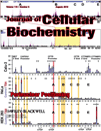
ARCHIVES OF PHYSIOLOGY AND BIOCHEMISTRY
Scope & Guideline
Exploring the Interplay Between Physiology and Biochemistry
Introduction
Aims and Scopes
- Metabolic and Endocrine Physiology:
Research exploring the mechanisms of metabolic regulation, hormonal influences on metabolism, and their implications for diseases such as diabetes and obesity. - Oxidative Stress and Antioxidant Defense:
Studies investigating the roles of oxidative stress in cellular damage and disease progression, along with the effects of various antioxidants in mitigating these processes. - Inflammation and Immune Responses:
Research focused on the inflammatory pathways involved in chronic diseases, particularly how they relate to metabolic syndromes and cardiovascular conditions. - Pharmacological Interventions and Natural Products:
Exploration of pharmacological agents and natural compounds for their therapeutic effects on various metabolic and degenerative diseases. - Animal Models in Disease Research:
Utilization of animal models to understand disease mechanisms, test new therapies, and study the physiological and biochemical changes associated with various conditions. - Molecular and Cellular Mechanisms:
Research detailing molecular pathways involved in disease processes, including signaling pathways that regulate cellular functions related to metabolism and health.
Trending and Emerging
- Diabetes and Metabolic Syndrome Research:
A significant increase in studies focused on diabetes, insulin resistance, and metabolic syndrome reflects the growing public health crisis associated with these conditions. - Role of Non-coding RNAs in Disease:
Emerging research on non-coding RNAs, such as lncRNAs and microRNAs, highlights their regulatory roles in various diseases, particularly in metabolic and cardiovascular contexts. - Impact of Gut Microbiota on Metabolism:
An increasing focus on the relationship between gut microbiota and metabolic health, exploring how gut health influences systemic metabolic processes. - Therapeutic Effects of Natural Products:
There is a rising trend in investigating the therapeutic potentials of natural compounds and herbal extracts, emphasizing their role in disease prevention and management. - Oxidative Stress and Inflammation Interplay:
Research increasingly explores the interplay between oxidative stress and inflammation in chronic diseases, highlighting their combined effects on health outcomes.
Declining or Waning
- Traditional Dietary Supplements:
Interest in conventional dietary supplements has decreased, as research shifts towards more innovative and targeted therapies for metabolic disorders. - Basic Biochemical Pathways without Clinical Relevance:
Research focusing solely on fundamental biochemical pathways without clear clinical implications is less frequently published, as the journal now emphasizes studies with direct relevance to health and disease. - General Reviews of Common Diseases:
There is a noticeable reduction in general review articles that do not provide new insights or innovative approaches, reflecting a preference for more specific and novel research contributions.
Similar Journals

METABOLIC BRAIN DISEASE
Connecting disciplines to combat brain disease.METABOLIC BRAIN DISEASE, published by SPRINGER/PLENUM PUBLISHERS, is a leading journal dedicated to advancing our understanding of the metabolic processes impacting brain health and disease. Established in 1986 and set to continue until 2024, this journal encompasses a wide range of interdisciplinary research that intersects the fields of Biochemistry, Cellular and Molecular Neuroscience, and Neurology, as evidenced by its notable quartile placements in Q2 and Q3 for 2023. With an ISSN of 0885-7490 and an E-ISSN of 1573-7365, it serves as a vital resource for researchers and practitioners aiming to deepen their insights into cerebral metabolic disorders and their implications. Although currently not an Open Access option, its rigorous peer-review process ensures that high-quality, impactful research reaches its audience. Showcasing a significant rank within the top percentile of its categories, METABOLIC BRAIN DISEASE is instrumental in shaping the future of neurological research and clinical applications.

Antioxidants
Advancing knowledge on the power of antioxidants.Antioxidants is a premier open-access journal published by MDPI that has been actively contributing to the field of antioxidant research since its inception in 2012. Based in Switzerland, the journal holds a noteworthy impact factor indicative of its scholarly influence, particularly given its high rankings in various categories. As of 2023, it proudly sits in the Q1 quartile in Biochemistry, Clinical Biochemistry, Food Science, and Physiology, solidifying its status as a critical resource for innovative studies. With a strong focus on the roles of antioxidants across multiple disciplines—ranging from molecular biology to food science—this journal serves as a vital platform for researchers, professionals, and students aiming to advance knowledge in mitigating oxidative stress and enhancing health through dietary and therapeutic approaches. The open-access model guarantees wide accessibility, allowing for the dissemination of significant research findings globally, making it indispensable for anyone engaged in modern biochemical and physiological studies.

CELLULAR SIGNALLING
Illuminating Pathways in Biochemistry and GeneticsCELLULAR SIGNALLING, published by Elsevier Science Inc, is a premier journal within the realm of Cell Biology, boasting an impressive Q2 category ranking as of 2023. With an ISSN of 0898-6568 and an E-ISSN of 1873-3913, the journal has established itself as a critical platform for advancing the understanding of cellular mechanisms and signal transduction pathways since its inception in 1989. Covering a vast array of topics in Biochemistry, Genetics, and Molecular Biology, it ranks notably at 87 out of 285 in the Scopus list, placing it in the 69th percentile among its peers. The journal serves as an invaluable resource for researchers, professionals, and students seeking high-quality, impactful studies that drive forward the field of cellular biology. While it operates under traditional subscription access, its highlights include rigorous peer-reviewed articles, reviews, and insights that continue to shape current scientific discourse.

ACTA BIOCHIMICA ET BIOPHYSICA SINICA
Connecting Researchers to the Heart of Life Sciences Discovery.ACTA BIOCHIMICA ET BIOPHYSICA SINICA, an esteemed journal published by SCIENCE PRESS, is a leading platform in the fields of biochemistry, biophysics, and molecular biology. Based in the United Kingdom, this journal has consistently ranked in the Q2 category for Biochemistry, Biophysics, and Medicine (miscellaneous) in 2023, showcasing its commitment to high-quality research and innovation in life sciences. With a convergence period extending from 1996 to 2024, it features critical insights into biochemical and biophysical processes that underlie biological phenomena. Researchers and professionals seeking to stay at the forefront of discoveries will find its articles to be both informative and transformative. Although not an open-access journal, ACTA BIOCHIMICA ET BIOPHYSICA SINICA aims to advance knowledge and foster collaboration among scientists worldwide, emphasizing its role in the dynamic landscape of biomedical research.

INTERNATIONAL JOURNAL OF BIOCHEMISTRY & CELL BIOLOGY
Unlocking the Secrets of Life at the Cellular LevelThe International Journal of Biochemistry & Cell Biology, published by Pergamon-Elsevier Science Ltd, stands as a pivotal resource in the fields of biochemistry and cell biology. With an ISSN of 1357-2725 and an E-ISSN of 1878-5875, this prestigious journal has been a key platform for disseminating cutting-edge research since its inception in 1995. The journal currently holds an impressive Q1 ranking in Biochemistry and a Q2 ranking in Cell Biology for the year 2023, reflecting its commitment to high-quality research and its influence within the scientific community. With a significant Scopus ranking of 94/438 in Biochemistry and 96/285 in Cell Biology, the journal plays a crucial role in advancing knowledge and fostering innovative approaches in these dynamic fields. Though it is not an open-access journal, the International Journal of Biochemistry & Cell Biology remains accessible to a wide audience, making it a vital resource for researchers, professionals, and students alike, who are eager to explore and contribute to the ongoing advancements in biochemistry and cell biology.

JOURNAL OF CELLULAR BIOCHEMISTRY
Unraveling the Complexities of BiochemistryJournal of Cellular Biochemistry is a premier academic journal dedicated to advancing the field of biochemistry and cellular biology. Published by Wiley, this influential journal has a significant impact factor that underscores its relevance and authority within the scientific community. With its ISSN 0730-2312 and E-ISSN 1097-4644, the journal has been on the frontier of research since its inception in 1982, and is expected to continue publishing cutting-edge studies through 2024. As evidenced by its ranking in the 2023 Scopus Quartiles, it holds a rank of Q2 in Biochemistry and Q3 in both Cell and Molecular Biology, placing it among the top tiers of scientific journals in these disciplines. The Journal of Cellular Biochemistry serves as a vital resource for researchers, professionals, and students alike, providing a platform for the dissemination of innovative ideas and findings that shape our understanding of cellular processes and biochemical pathways. Though it does not currently offer Open Access options, its robust peer-review process ensures that each publication meets the highest academic standards, thus solidifying its esteemed position in the landscape of biochemical research.

BIOCHEMICAL JOURNAL
Advancing the Frontiers of Biochemical ResearchBIOCHEMICAL JOURNAL, published by Portland Press Ltd, stands as a leading publication in the fields of Biochemistry, Cell Biology, and Molecular Biology, reflecting a commitment to advancing scientific knowledge since its inception in 1945. With a distinguished Q1 ranking across these categories and impressive Scopus rankings, the journal serves as an invaluable resource for researchers, professionals, and students alike, facilitating critical discoveries and innovative research practices. Although not currently offering open access, the journal provides a platform for high-quality peer-reviewed articles, ensuring rigorous standards in the dissemination of biochemical research. Spanning over seven decades and continuing through to 2024, the BIOCHEMICAL JOURNAL fosters an environment where cutting-edge biochemical research thrives, supporting the global scientific community's efforts to address complex biological questions and enhance our understanding of fundamental cellular processes.

BIOFACTORS
Bridging Laboratory Discoveries with Clinical ExcellenceBIOFACTORS, an esteemed journal published by Wiley, serves as a pivotal resource in the fields of Biochemistry, Clinical Biochemistry, and Molecular Medicine. With ISSN 0951-6433 and E-ISSN 1872-8081, the journal has established its reputation since its inception in 1988, showcasing a rich history of scientific inquiry and innovation. Recognized for its high academic standards, it currently holds a Q1 ranking in key categories, including Biochemistry and Medicine (miscellaneous), and ranks in the top 10% for Clinical Biochemistry according to Scopus metrics, reflecting its impact and influence in the scientific community. Although it does not offer Open Access, BIOFACTORS provides researchers the opportunity to publish and disseminate high-quality studies that advance our understanding of biological factors and their clinical implications. The journal actively encourages contributions that bridge the gap between laboratory findings and clinical applications, making it a vital platform for both seasoned researchers and emerging scholars in the life sciences.

Frontiers in Physiology
Elevating the standards of physiological scholarship.Frontiers in Physiology, published by FRONTIERS MEDIA SA, is a leading open-access journal that has been at the forefront of physiological research since its inception in 2010. As a reputable publication based in Switzerland, it aims to foster the dissemination of groundbreaking findings across various domains of physiology, engaging a global audience of scholars and practitioners. With a commendable Q2 ranking in the fields of both general physiology and medical physiology for 2023, this journal stands out in its field, achieving a significant Scopus rank of #32/113 in medical physiology and #58/193 in biochemistry, genetics, and molecular biology. Frontiers in Physiology not only commits to maintaining high scholarly standards but also ensures that all its articles are freely accessible, thereby promoting collaborative knowledge exchange. With a clear focus on advancing our understanding of physiological processes, the journal plays a crucial role in the development of innovative approaches to health and disease, making it an essential resource for researchers, professionals, and students alike.

Molecular Metabolism
Unlocking the Secrets of Molecular MetabolismMolecular Metabolism is a premier, open-access journal published by Elsevier, dedicated to advancing the understanding of metabolic processes at the molecular level. With an ISSN of 2212-8778 and a proud presence in Germany, the journal has made significant contributions to the fields of Cell Biology and Molecular Biology, consistently achieving a Q1 ranking in both categories as of 2023. The journal’s scope encompasses cutting-edge research that explores metabolic pathways, their regulation, and implications for human health, underscoring the interplay between metabolism and various biological functions. Researchers and professionals benefit from the journal’s robust visibility, as it ranks #40 among 410 journals in Molecular Biology and #35 among 285 in Cell Biology according to Scopus metrics, placing it in the top 10 percentile in its field. With open access since 2012, Molecular Metabolism ensures that groundbreaking research is available to all, fostering a collaborative and inclusive academic environment. Its commitment to excellence and accessibility makes it an invaluable resource for those invested in metabolic research.